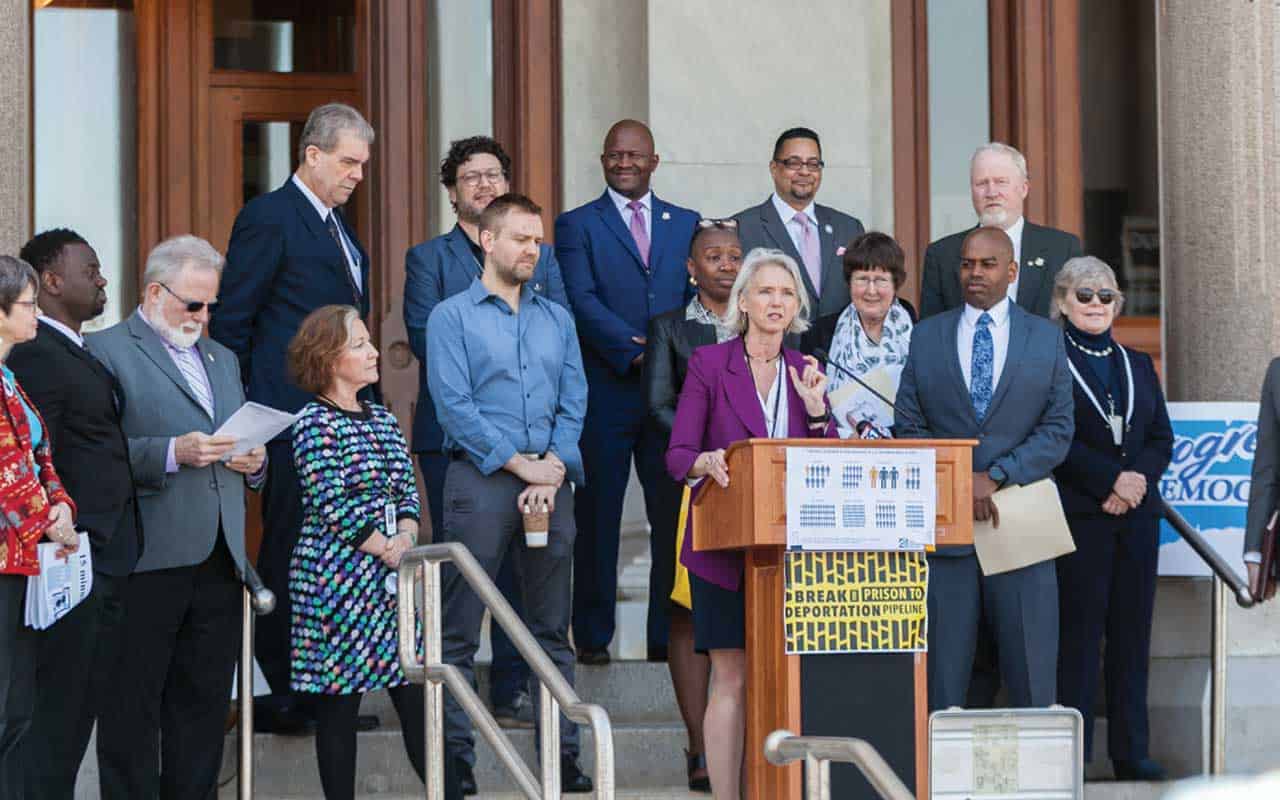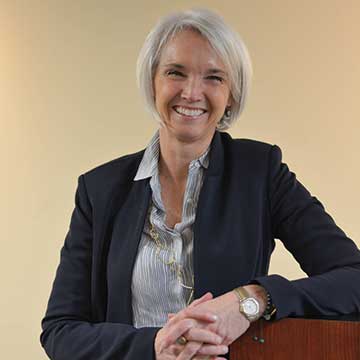This Month’s Featured Article

Setting Her Own Precedents
 It was a sunny day in the Capital on Wednesday, March 4 1885. As the newly elected, 22nd President of the United States, Grover Cleveland placed his left hand on the Bible his mother had given him when he was 15 and took the oath of office under pleasant skies and in front of a congenial crowd in Washington, DC.
It was a sunny day in the Capital on Wednesday, March 4 1885. As the newly elected, 22nd President of the United States, Grover Cleveland placed his left hand on the Bible his mother had given him when he was 15 and took the oath of office under pleasant skies and in front of a congenial crowd in Washington, DC.
History remains quite uncertain where Belva Ann Lockwood was during the historic gathering, though it cannot forget the struggles she endured in her efforts to stand in President Cleveland’s stead. Lockwood herself was one of the first female attorneys to practice in the country and after petitioning Congress for the right to practice before the US Supreme Court, she became the first woman to become a member of the Supreme Court in 1879. Despite being told repeatedly that God himself would rebuke her participation in Democratic government, Lockwood would go on to run for President in 1884. As the candidate for the National Equal Rights Party, Lockwood’s grim campaign would be marred by waves of resistance including professional indignities, voter fraud, and a national media that commonly referred to the iconoclast as “old lady Lockwood.”
Despite massive resistance, Lockwood’s resolve would successfully plant the seeds for cultural revolution in the decades to come and she is perhaps most remembered for saying, “the glory of each generation is to make its own precedents.” For those gathered on that perfectly pleasant early March day in 1885, her words couldn’t have been more prophetic.
The time is now
132 years later the weather was decidedly more dreary in the nation’s Capital for the crowds who amassed in Washington, DC, on January 21, 2017, one the day after President Trump’s inauguration, to partake in what is now known as the Women’s March on Washington. The largest single-day protest in the country’s history was a moment for many to speak up, speak out, come together, or simply have fun. But for Maria Horn, the moment provided the accelerant for her fiery ambitions and precipitated a successful run for State Representative as a member of Connecticut’s 64th Assembly district.
“I remember I had thoughts of running for office before that day at various points in my life, it was something that was always on my periphery, but that day I had more fun standing in one cubic square foot of space than I had experienced in a long time. It was then I thought, this is it – the time is now.”
After earning her Bachelor’s degree from Princeton in the mid 80s, Representative Horn attended the University of Chicago Law School where she earned her Juris Doctor Degree in 1993. For most of her professional career, Representative Horn found herself in New York where she worked for the US Attorney’s Office for the Southern District of New York as an Assistant US Attorney for the Criminal Division.
As a proud member of the Salisbury, CT, community, where she lives with her husband and their three children, Representative Horn has served on behalf of a variety of local causes including chairing the Board of Trustees of the Indian Mountain School in Lakeville, a member of the Board of Directors for the Domestic Violence Prevention Agency and the Women’s Support Services in Sharon. Today, in addition to being a member of Connecticut’s 64th Assembly district, she has been voted onto the board of the Northwester Connecticut YMCA.
Though Belva Ann Lockwood’s bid for the highest office in the land may have fallen on ignorant ears, generations later her indomitable spirit has been fully realized in the precedents set by women like Maria Horn who carry the torch for political leadership into the twenty-first century.
Was there something specific that drew you to the Northwest Corner and Litchfield County when it came time to seriously consider running for office?
MH: Though we met when I was living in New York, my husband went to the Hotchkiss School in Salisbury, CT. I grew up in rural Northeastern Ohio and despite the geographic distance, there are lots of similarities between the cultural fabric of the Midwest and that of the Northwest Corner. One of the things I really enjoy about this region in general is that it’s an area that reveals itself to you gradually. The longer you live here, the more there is to discover. There are certain issues that people hold so dear here that they become part of the character of the many towns in the 64th district. The fact that there is a culture that is so ingrained into the heart of the area is something I just love. The more time you spend here the more you become naturally committed and feel compelled to become involved in the many non-profit organizations and committees.
I have had the privilege of working with schools, domestic violence and women support services in Sharon, and that involvement has connected me with even more residents. That web of community support became critical for me to experience and the interconnectedness of all these non-profits touched me and began to build something within me – a drive to serve on a proactive level.
The Midwestern United States has been home to many conservative political ideals, yet you remain a member of the Democratic Party. How did your political ideals transform over time?
MH: I grew up in a conservative family, my mother was a fervent Republican. This was during a time when a woman could more easily be considered both a feminist and Republican and she certainly was. My mother was also very active in our community, standing up for the rights of women while still maintaining what we might characterize today as a politically conservative perspective.
During my youth and in college I saw firsthand much of the 20th century sexism and misogyny that pervaded our culture and I thought then that it was only temporary, I would tell myself to give our culture twenty years or so and everything would change and, to some degree, many things have. I do feel however that the Republican party of today has shifted a great deal to the ‘right’ and, in some ways, it left me behind. I maintained my Republican beliefs throughout college though they were strained. After college, I began to realize the issues that were important to me and those ideals I wanted to advocate for lined up with those on the other side of the proverbial ‘aisle’. I admired my mother tremendously and she still has an enormous influence on me. Sometimes I think we rebel against our parents’ political beliefs as a natural part of maturation, but I also think that’s a bit derivative as well.
Reproductive health issues, among others, became very important to me as time went on and that was something that also drew me to the party I serve today. When I moved to New York I started to really become aware of the distinct differences in advantages and disparities that primarily fell along gender and racial lines. Eventually, these issues became undeniable as I surveyed my own cultural landscape. I firmly believe – regardless of party affiliation or political ideal – we need to look more deeply into our institutions and systemic attitudes in order to truly proactively broach social inequities.
As your professional career progressed, your path lead you through several traditionally male-dominated fields including corporate finance, criminal law, and now politics. Have you seen a transformation in any of these arenas?
MH: It’s true [laughing] I have worked in many male-dominated environments and I enjoyed them and acclimated to them in ways that I look back at very differently today. I thought then “this is what you do, you need to acclimate yourself to this kind of environment.” I am a pretty quantitative person by nature so I could handle the analytical part of my past jobs, but I certainly didn’t possess an intrinsic interest in corporate finance.
When I worked in criminal law I was heavily influenced by a female judge who I worked for and she would not let me forget how important it was to have female prosecutors and female judges. I guess you could say I really cut my teeth working as a federal prosecutor and getting to know different government agencies. The women I worked with were truly at the vanguard of the revolution in criminal prosecution and we remain good friends even to this day.
As far as the political arena is concerned, particularly when it comes to the state of Connecticut, I was astonished to learn that there were more women in the Connecticut state legislature in the year 2000 than there were in 2016. That all changed in 2018, because I think there exists a major fundamental difference in state politics versus federal politics.
Have you noticed a significant difference in bipartisanship in local politics given the national divide that seems to pervade the current overall atmosphere? What are some of the aspects currently taking place in CT that are helping to foster that bipartisanship?
MH: I’m still only a freshman, but I feel the divide in Washington doesn’t necessarily reflect the same attitudes at the local level. There still exists an encouraging amount of bipartisanship in the legislature and that cultivates further diversity in politics. In 2019, 69% of legislative votes were overwhelmingly bipartisan in Connecticut. Many of the processes that make state legislature function are driven by tradition, fortunately in our area, tradition means community and a healthy respect for those around you.
Currently, the state budget is having perhaps the most impact on our two-year cycle, which is broken down into long and short sessions. Despite being a part-time legislature, my colleagues and I sit for five months in the first year and three months in year two. During the long session essentially anything is possible when it comes to passing legislation. Our short session specifically addresses the budget because it deals mostly in state revenues and expenditures. The budget itself is very quantitative, extensive, and must be as comprehensive as possible to properly serve voters. When you cut a lot of state employees like CT has over the last decade, you wind up with a lot of overtime in these necessary fields. Sometimes revenues are in surplus, so budget adjustments are fundamental to state execution.
During the short session – despite the budget passed last year – representatives are only supposed to propose bills that are fiscal in nature. As a vice-chair of appropriations there plenty of days where I feel more like a body and not a brain. I am persistent however in my pursuit to follow through with committee chairs and fellow legislators in regard to bills that I have been advocating for since I began my campaign.

What are some of the pursuits you find to absolutely critical to the overall health of the State of Connecticut?
MH: Since 2008, CT has cut 16,000 jobs and the Connecticut Department of Energy and Environmental Protection (DEEP) has been one of those agencies most affected by this. We must be aware of the legislative obligations placed on organizations that are so critically understaffed. State tolling has been another very passionate issue raised by Connecticut voters recently. Firstly, it’s important to rebuild voter trust when it comes to tolls because when you’re talking about fees state-wide people want to know that their money and resources are going toward something substantive. There has been a somewhat visceral opposition when it comes to tolling and I can understand both perspectives. Infrastructure is so important to the state of Connecticut, our obligation is to come together and decide whether this should be paid for by taxpayers or shared with people who pass through our state.
A critical aspect to my campaign, and an issue that I am deeply invested in is the current state of our solid waste distribution. We currently have 50 towns that utilize Materials Innovation Recovery Association (MIRA), a burn facility outside of Hartford. This facility is currently on the verge of collapse and would require somewhere around a $350 million investment to upgrade. On top of the financial commitment it requires, there are environmental justice issues associated with the facility itself. Today, local households pay $85 dollars in fees and those will rise to $145 if we make this investment and most of us don’t want to go out of state or use landfills. When voters hear about investing in more sustainable resources they sometimes tend to associate these initiatives with higher taxes or fees, and think that perhaps the state is simply looking to draw a profit. The point of new initiatives, like Connecticut’s recent ban on plastic bags, is to change behavior more than generate government profits. We need to do better collectively in terms of how we actually recycle.
As someone at the forefront of local politics, a leader and a woman, can you say with certainty that our political structure is trending toward a more equitable approach?
MH: Human behavior, from my perspective, is trending in a positive direction and our local legislature is truly invested in the best interests of constituents. Even if we totally disagree on policy, the heart of Connecticut’s resident interests remains. Relationships must be built, moreover they must be decided to be built. I can see the national mood beginning to factor in a little bit more, but it remains up to those of us who consider themselves moderate compromisers to maintain a working bipartisan relationship.
I love having friendly conversations with people who disagree.
Everything takes work – but you must work at it. Put yourself out there and make yourself uncomfortable.
I purposefully chose the last democratic office in the legislature so the people who surround me are Republicans in order to build that connection with the people who may disagree. It is essential that representatives choose to work through things that are hard and participate in proactive discourse without demonizing people.
You can listen to people and hear what they say without sacrificing your principles. Maybe you won’t agree with anything, but relationships are the foundation of democracy.
To learn more about Representative Maria Horn or to speak with her, you can reach her at Legislative Office Building, Room 4000, Hartford, CT, by calling (800) 842-8267 or (860) 240-8585, or by emailing her at Maria.Horn@cga.ct.gov.


